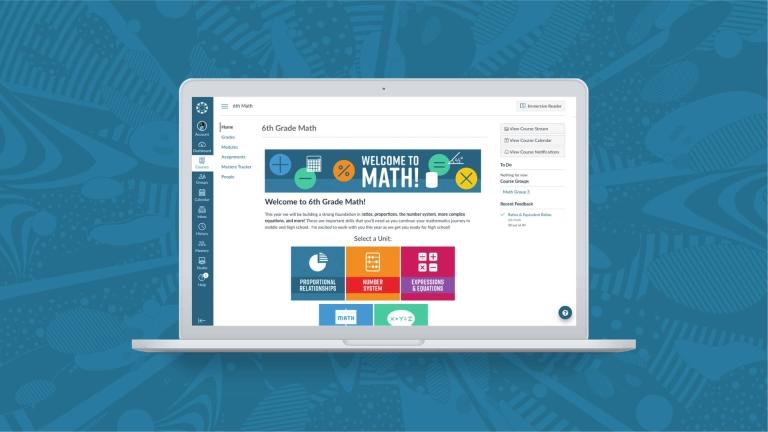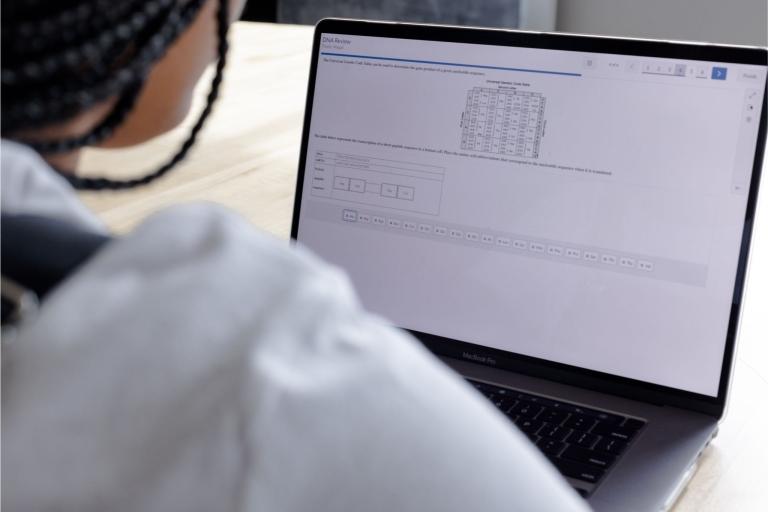
Schools exist to create and foster a love of learning in students.
One of the most meaningful ways schools can meet students where they are is through personalized learning. As schools increasingly look to personalized learning paths to drive student outcomes, teachers must first understand what their students do and do not know to create those paths. Formative assessment gives teachers the data they need to make informed classroom decisions.

Formative assessment is an incremental practice for evaluating student learning and providing feedback to improve student understanding. It helps teachers assess what students have learned, what they need to learn next, and how to adjust teaching strategies.
Implementing formative assessment strategies requires a mindset of continuous improvement and commitment to student-centered learning.
Here are some basic principles of formative assessment:
- Help teachers identify learning objectives and assess student progress.
- Provides ongoing feedback that is timely, relevant, and specific to help identify the strengths and weaknesses of individual students.
- Formative assessment informs instruction, and teachers can use the data to personalize learning and change their lesson plans, teaching strategies, and instructional materials.
- Involves active student participation in learning, allowing students to be responsible for their education.
- Formative assessment is essential for teachers to help students achieve their learning goals and mastery.
Let's explore some of the positive impacts formative assessment has on learners.
11 Ways Formative Assessment Benefits Learners
1. Increases Student Confidence
Formative assessment creates an environment that celebrates achievements throughout instruction. Students gain valuable practice as they overcome minor challenges. By setting achievable goals and receiving regular feedback, students can see their progress over time, boosting their confidence and motivation and forging their path to mastery.
2. Boosts Student Engagement
Empowering learners to take an active role in their education fosters an understanding of the value of effort. Instead of passively retaining information, the formative assessment allows students to participate actively in learning. Students reflect on their learning and receive feedback on their progress, which can help them feel more involved and invested in their education. An interactive class environment encourages knowledge-sharing and participation, increasing student engagement.
3. Fosters a Growth Mindset
Students receive feedback on their progress rather than their performance, fostering a growth mindset. In addition, students begin to see challenges as opportunities for growth and learning, which boosts their class involvement and commitment to the learning process.
4. Strengthens Analytical Skills
Formative assessment prompts students to apply their acquired knowledge and draw conclusions based on their evaluation of the information. These activities help students build their analytical skills by requiring them to think critically and systematically about the information presented. Formative feedback enables learners to recognize task-related strengths and weaknesses, further fostering problem-solving ability.
5. Encourages Student Accountability
Students receive timely and personalized feedback from teachers, encouraging self-reflection and action. Practical assessment techniques help students take ownership of their learning and set personal goals. Students develop an intrinsic need to reach their unique milestones as they strive for personal success.
6. Builds Communication Skills
As students engage in learning, they discover how to express their ideas effectively. Clear articulation and demonstration of material supports content mastery. Therefore assessments that drive communication are valuable. For instance, teachers apply simple class conversations as a quick and informal way to gauge student understanding.
7. Helps Students Develop a Positive View of Assessment
Result-focused assessments can cause student stress, creating an apprehensive learning experience and barriers to growth. Educators can transform how students view assessments. By focusing on the student and their opportunity to learn, teachers can improve learning outcomes. Shifting to a learning-based approach helps the students focus on the content, decreasing anxiety and result-based concerns.
8. Fuels Data-Driven Instruction
Formative assessment provides teachers with real-time data that can transform their instructional approach. Unlike end-of-unit tests that often come too late for meaningful intervention, formative assessments generate immediate insights into student understanding. Teachers can track learning patterns, identify knowledge gaps, and adjust their teaching strategies accordingly. This continuous feedback loop ensures that instructional decisions are based on concrete evidence rather than assumptions, leading to more effective and targeted teaching practices. (See how DeSoto 73 brought data-driven instruction to life with Mastery Connect.)
9. Validates Teacher Instincts
Experienced educators often develop keen intuitions about their students' progress and struggles. Formative assessment serves as a powerful tool to confirm or challenge these instincts. When assessment data aligns with a teacher's observations, it builds confidence in their instructional judgment. Conversely, when the data reveals unexpected results, it prompts valuable reflection and adjustment. This combination of experiential wisdom and objective feedback creates a more robust foundation for classroom decision-making and pushes teachers to keep learning.
10. Increases Assessment Rigor
Formative assessment encourages a higher level of rigor helps students develop critical thinking skills while providing teachers with richer insights into student learning. The frequent nature of formative assessment also allows for the gradual introduction of more challenging content, ensuring students are appropriately challenged without becoming overwhelmed.
11. Prepares Students for Summative Assessments
Regular formative assessment serves as an excellent preparation tool for high-stakes summative evaluations and end of-year-standarzed tests. By familiarizing students with various question types, assessment formats, and performance expectations, formative assessment reduces test anxiety and builds confidence. More importantly, it helps students identify and address their knowledge gaps well before summative assessments occur. This ongoing preparation ensures that summative assessments truly reflect student capabilities rather than their ability to cram or handle test pressure.
Utilize Multiple Assessment Methods
Various formative assessment methods will help you get a comprehensive picture of student learning. You can also provide learners with voice and choice when demonstrating mastery, which promotes ownership of learning.
- Presentations: Provide opportunities for students to demonstrate their understanding of the learning material and engage with the class. Presentations can take various forms, such as a slideshow, a video, a poster, or a speech.
- Projects: Students use their knowledge of the material and skills to create something new or solve a problem
- Collaborative work: Use peer assessment and feedback or group projects to help students learn from each other and develop their teamwork skills.
- Observations: We all want to be data-driven, but gathering evidence through open-ended observations is also critical in providing feedback and informing instruction.
Strategies to Implement Formative Assessment
Formative assessment is an effective tool that prioritizes the learner. Students benefit from skill-building, ongoing feedback, and adjustments to instruction throughout the learning process. Learn how to implement formative assessment in the classroom effectively.
- Call and respond: Educators can juggle open, closed, and high-order questions while using engagement techniques to boost their Q&A sessions. Closed questions help measure material recall and retention. Open and high-ordered questions require further elaboration, allowing students to express their comprehension of the material.
- Exit tickets: At the end of a lesson, teachers can provide a short activity or prompt for students to complete to check for understanding. Exit tickets help identify areas where students may need additional support or clarification for the next lesson.
- Conversations: Conversations can be a valuable formative assessment tool in 1:1 or small group discussions. Teachers can gain insight into their thought processes and understanding of the material by engaging in dialogue with students.
- Think-pair-share: Teachers can provide a prompt or question for students to reflect on briefly before discussing with a partner.
Formative Assessment Tools for Teachers
Continue to explore effective formative assessment methods and techniques to add impact in the classroom, improve student outcomes, and drive learner success. Explore more key strategies for impactful formative assessment.
Related Content
 Teaching-With-Tech-10-Benefits.jpg
Teaching-With-Tech-10-Benefits.jpgBlogs
 edtech_selection.jpg
edtech_selection.jpgBlogs
 untitled_design.jpg
untitled_design.jpgBlogs
